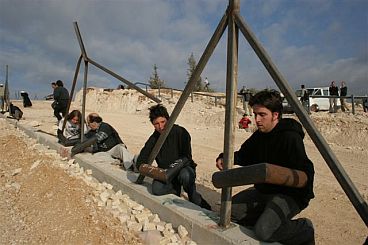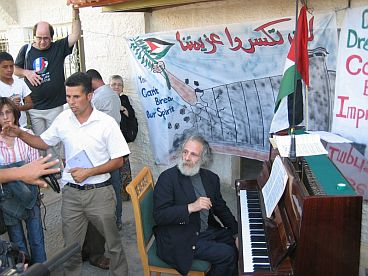Adam Keller’s report

(links Adam Keller)
(Adam Keller is een ervaren activist die met de mensen van Gush Shalom van Uri Avnery al vele jaren lang demonstreert. Nu bij de Muur zoals die bij Bilin wordt gebouwd, samen met de Palestijnen die durven, want als die opgepakt worden krijgen ze het erg veel moeilijker dan een gearresteerde Israeli. Voor de zoveelste keer werd hij opgepakt – om een paar uur later weer vrijgelaten te worden. Hierbij zijn verslag. Lees vooral de discussie met de soldaten)
Upon coming back late in the evening, after a long day, I found a considerable amount of support and solidarity messages from all over the world – very touching, but also a bit embarrassing since I was let go after no more than a few hours in custody while the eighteen Palestinians arrested in nightly raids on Bil’in during the past week remain at Ofer detention Camp, with no sign that the army intends to release them any time soon. Not even the 14-year old Abdullah Yassin, about whom a special campaign is being launched.
For me and a group of other activists, mostly from the Anarchists Against Fences, it began on Thursday night. We boarded private cars in the centre of Tel-Aviv, got off on a dark road at the edge of the West Bank, walked through several fields and into a nearby Palestinian village. We had to wait for half an hour at an inconspicuous rendezvous point while two army helicopters passed high above in an unknowable mission, but were finally picked up by a Palestinian van and taken to Bil’in.
There, we found the group of earlier-arrived activists and some of the Bil’in Palestinians already busy practicing a new “weapon”, often used in various non-violent struggles in Europe but rarely if ever seen in Israel or the Occupied Territories: two lengths of pipe, joined at right-angles. When you wrap steel chains around both your wrists, insert both arms in and connect both chains with a lock, it should be nearly unbreakable, an hours-long headache for the army and police.
“When we tie ourselves with these pipes to the triangular pillars prepared for the Fence, the only way to get us off would be for them to undo their own work and break their own pillars” said L., who introduced us to the new device. We all fell to enthusiastically practising – and all of us made a small beginner’s mistake, which in retrospect should have been obvious and easily corrected and which in the event made the army’s task much easier.
After several hours of sleep in an improvised dormitory at a Bil’in houses, its floor crowded with mattresses, we got up and hastily equipped ourselves with chains and pipes. At 8.00 am, a short drive brought us to a section of the fence construction far from the army patrols. Their look-out were alert and the jeeps were on the scene within minutes – but we were already clamped down securely, each to his or her chosen triangular pillar, and with quite a few media representatives training their cameras on us and awaiting developments.
We suffered a rude shock when, due to the mistake, the soldiers did succeed in prying us loose, forcibly shoving and pulling our arms out of the pipes. The most persistent of us lasted no more than five minutes. We were led to a jeep. But there were not enough soldiers to mount effective guard, and most of the others succeeded in making their way back into the village, some even managing to salvage the pipes for another try. A hasty consultation soon located the problem, and by 10 am they were back for another and more successful try. (We detainees later got a brief glimpse out of the police car windows, of soldiers pulling and pulling on them to no effect.)
The original place of detention for three of us was under a tall olive tree on the other side of the Fence – part of the olive groves of which the Bil’in villagers are being deprived.
After an hour, a fourth prisoner arrived – an activist who had shouted “dirty bastard” at a soldier beating a Palestinian child. Then soldiers brought in a photographer of Al-Jazeera TV, with his bulky camera, who was charged with “assaulting a soldier”. His arrest was in fact the main issue dealt with by the media, as
http://www.haaretzdaily.com/hasen/pages/ShArtVty.jhtml?sw=four+others+also+arrested&itemNo=641748
The military and police powers-that-be were visibly frantic and chaotic in their efforts to arrange transportation to take us to the police station. Our guards were several times changed, for no reason which we (or for that matter, they) could see. Officers came and went, some barking angry retorts, others quite civil.
Throughout these hours we had the chance to engage in a rather bizzare kind of dialogue.
– Hey, put away these mobile phones! You are prisoners!
– You don’t know the law. As long as we guarded by soldiers we are not legally prisoners. Only after a police officer in a blue uniform comes and tells officially that I am under arrest.
– Say, do you folks only look like homos, or are you really ones?
– Why do you ask? Are you interested?
(Prolonged silence).
– Just tell, what do you want with all these Arabs? It is our land, if they don’t like it they can go to their Arab brothers in Jordan/
– How do you know it is our land?
– How do I know? It was always our land, even in the time of King Solomon.
– In the time of King Solomon this area was Jewish, true, but the coastal plain was Philistine. Are you willing to give up Tel-Aviv?
– Well, I don’t know about that, but this is still our land. We need it for security. My commanding officer told us we are doing a vital work for the country, we prevent suicide bombers from getting through.
– What your officer told you is all lies. You are not protecting our security here, you are just brewing up hatred by stealing the Palestinians’ land, that’s what is causing suicide boobings!
– Stealing? Who’s stealing anything? I just do my job. Do you think I like being in this damned hole? I am counting the days until I get out of the army.
– You don’t have to be here if you don’t want to. There are other ways. There are refusers…
– Refusers? Me refuse? Never! I know my duty and I do it!
– And if your commander tells you to go to Bank Leumi in Tel-Aviv and stand guard outside while robbers are breaking open the vault, would you do it?
– What? Of course not! What a stupid question to ask! And my officer would never tell me to do any such thing!
– Yes he would, he is telling you and you are doing it. You are guarding the construction of the fence which is going to steal more than half the lands of Bil’in. In fact, it is worse than a bank robbery, because the bank won’t go bankrupt when you rob one of their branches, but the families in Bil’in have no other livelihood than these olive trees here around us. And you are helping to rob them, that’s your job!
– That’s not true, the fence is legal, the government gave authorization to the army to build it.
– The government itself is acting illegally, it is illegal under International law.
At about this point, the drizzle which we felt for a quarter of an hour turned into a veritable deluge. We and our guards ran to the only shelter in sight – an armoured truck parked several hundred metres away. By the time we got there we were soaked all through. And though providing shelter from the elements, it was a very doubtful refuge – since crammed inside were some twenty soldiers, who did not at all relish the idea of crowding even further in order to make place for “leftist prisoners”.
The mass of them were far more hostile than the guards with whom we had come to some kinds of terms. Soon, they began chanting their own mocking versions of the slogans they must have heard on countless Bil’in protests: “Long live the Occupation! The Wall will Never Fall!”. Those standing nearby made more and more nasty remarks, and the Jazeera photographer got several jabs in his back from a rifle butt.
Fortunately, soon afterwards, the long awaited police patrol car arrived to take us all to the police station at the Giv’at Ze’ev settlement north of Jerusalem.
Some of our friends were already waiting there to provide dry clothing. We were not not put in cells, but kept in a kind of club where several policemen were drinking coffee and watching on an old TV set an indeterminable American movie about two down-at-luck boxers. There followed several hours of a new round of strange dialogue, punctuated with our being called to rather perfunctory interrogations and to provide mug photos and fingerprints. After some more interminable bureaucratic procedures, we were finally let out just before sundown, and prohibited from showing our faces at Bil’in for the next fifteen days.
Abdullah Yassin and the other arrested Palestinians remain at Ofer.

Pas was er in Israel een solidariteitsconcert met de Nederlands-joodse pianist Jacob Allegro. De man links op de foto met het Gush Shalom t-shirt is Adam Keller.
Ga voor meer nieuws naar de website van Gush Shalom
